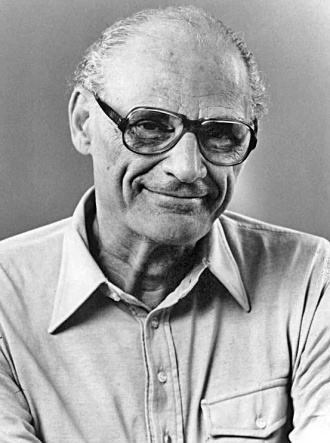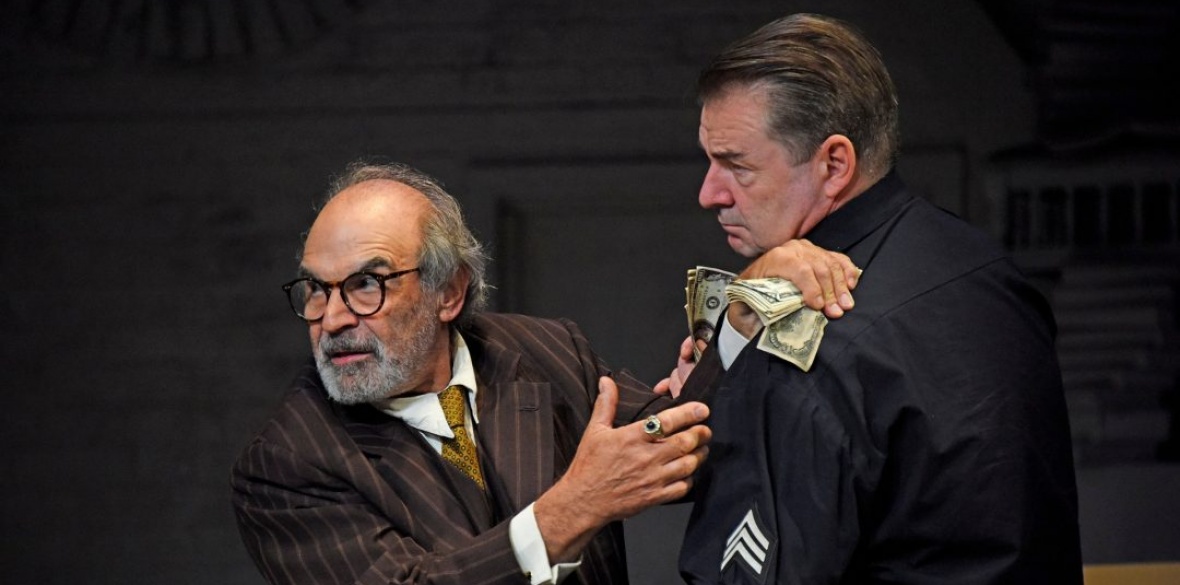This is the last article you can read this month
You can read more article this month
You can read more articles this month
Sorry your limit is up for this month
Reset on:
Please help support the Morning Star by subscribing here
IN A letter to his third wife Inge Morath, Arthur Miller once wrote that “a play always has two lives, the written one and the one lived.”

Fourteen years on from his death, the work of the man many consider to be the US’s greatest playwright continues to find new life forms on the London stage.
In the first half of this year alone, five of his works will be staged and such a flurry of productions begs the question: “Why now?”
According to David Suchet, who will revive his role of Gregory Solomon in The Price at the Wyndham’s Theatre in a transfer from Bath’s Theatre Royal, it is “pure accident.” But the sheer density of Miller productions suggests more than just coincidence.
Many will instantly point to the current occupant of the White House and the chaotic state of US politics to explain the splurge, but Miller never really tackled the institutions of state head-on.
His most direct attack on the US Establishment was his 1953 play The Crucible which engendered the mass hysteria of the Salem witch trials of 1692 to savage the flagrant cynicism of Joseph McCarthy and his House Un-American Activities Committee (HUAC).
When recalling his student days, Miller said that he understood why his peers “connected the Soviets with socialism and socialism with man’s redemption” but he never joined the Communist Party and did not consider himself a Marxist.
Yet The Crucible was a defiant denunciation of the sadistic tendencies of McCarthyism and remains perhaps the most enduring public stand taken against it.
The success of that play and Miller’s growing public profile at the time — not least because he married Marilyn Monroe in 1956 — saw him hauled in front of HUAC as it grew ever more desperate in its red-baiting.
Miller refused to become an informer, unlike his one-time friend and director of many of his early works Elia Kazan, who let his personal ambitions obscure his sensibilities.
Miller sent him a copy of his 1955 work A View From the Bridge to let Kazan know what he thought of “stool pigeons.”
This defiance against what he called the “popular fascism” of McCarthyism was characteristic of Miller and is surely one of the reasons he is being revived at this moment.
Jay Miller, artistic director of The Yard theatre which brings a female-led Crucible to Hackney Wick in March, says that the play “speaks of a world torn apart, a community that, driven by fear, becomes isolated individuals, scared and desperate to protect themselves.”
That comment resonates heavily at a time when Donald Trump’s attempts to force through a racist Mexican border wall are met with seemingly little public backlash on the US streets.
As progressives look across the Atlantic with bafflement at the lack of demonstrable resistance to Trump’s policies, many are even more puzzled at his continued popularity and this is where Miller’s work is potentially incisive.
Exploring the hollow centre of the American Dream was the Brooklyn-born dramatist’s raison d’etre, as will likely be evident in the Old Vic’s double-bill this spring. The rarely performed The American Clock is followed by All My Sons, one of his most acclaimed works.
The former, like much of his finest work, is a semi-autobiographical tale of a family’s financial decline following the Wall Street Crash of 1929, counterpoised by upbeat vaudeville period music written by the man himself.
Director Rachel Chavkin, who directs following the success of Hadestown at the National Theatre, calls it the “story of this unfolding failing of an economic system” and will attempt to universalise the piece by incorporating both a south-east Asian and an African-American family into the story. It seems an opportune moment to update one of Miller’s more indifferently received works.
In contrast, All My Sons will return to the West End for the third time with the weighty reputation of “a true 20th-century masterpiece,” according to the Old Vic’s artistic director Matthew Warchus. The story of rotten arms manufacturer Joe Keller exposes the dark heart of the greed-ridden American Dream that Trump still sells to his fan base 72 years on from its opening night.
With both Sally Field and Bill Pullman starring in Jeremy Herrin’s production, this promises to be a heavyweight offering, as does the final production of this accidental Miller season.
Marianne Elliot’s African-American reinterpretation of Death of a Salesman at the Young Vic is another stark critique of the ruthlessness of vulture capitalism. It features an extraordinary cast, including Wendell Pierce, Sharon D Clarke and Arinze Kene.
With classical takes, reimaginings and more than a sprinkle of star dust across the five differing shows, only time will tell how much retroactive light Miller will shed on Trump’s US.
But one thing is for sure — he will provide drama of the highest class.









